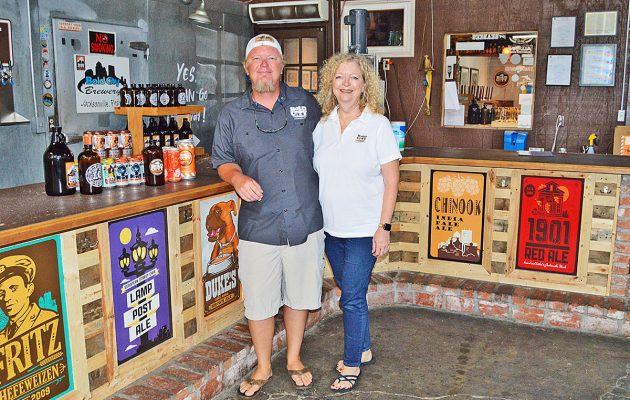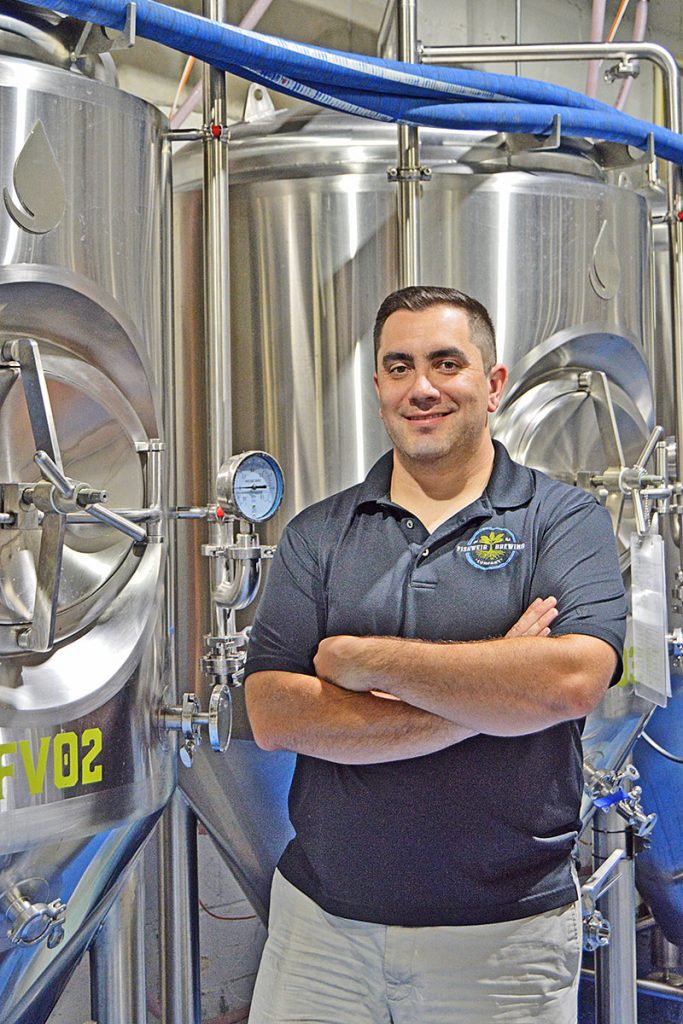
Brian and Susan Miller, owners of Bold City Brewery
Before the coronavirus hit, Jacksonville was getting a reputation as a great place for craft beer.
“We’ve built tourism around our breweries,” said Brock Flores, owner of Fishweir Brewing Company in Murray Hill. “We have a great beer scene.”
Make that “had” a great beer scene.
Jacksonville’s breweries have become one of the casualties of the Coronavirus.
The state ordered breweries, bars, and restaurants to shut down on March 17 — St. Patrick’s Day, always a busy day. They were only allowed to offer to-go service.
“When everything was shut down, when it was to-go, our sales were right on target,” Flores said. “We kept all of our staff with no reduction in pay.”
During the state’s Phase 2 reopening on June 5, breweries and bars were allowed to reopen at 50% capacity indoors and full capacity outdoors. Patrons were required to be seated; no standing-room service was allowed.
But when the rate of COVID-19 infection surged, the state Department of Professional Business Regulation (DPBR) banned on-site consumption of alcohol on June 26. Despite statewide complaints, and a lawsuit by bar owners in Volusia County, on July 11, Florida Gov. Ron DeSantis stood firm on the ban.
Last week, DPBR Secretary Halsey Beshears began meeting with craft-brewery and bar owners in an effort to resolve the dispute.
Establishments that had food licenses, known commonly as 509 licenses, could continue to serve customers, but most breweries don’t have food licenses.
“When we reopened, we were doing things the right way,” Flores said. “We were doing table service. Everyone was wearing masks. It was the bars that ruined it. Breweries were the good actors, but the state cast a wide net rather than policing the bad actors.”
It’s what Preben Olsen, owner of Aardwolf Brewing Company in San Marco, calls discrimination by license type.
“We’ve been arguing the hypocrisy of this. They haven’t reduced the number of people drinking, just reduced the number of places. It’s discriminating based on license type.”
The DPBR says it doesn’t have enough agents to monitor alcohol consumption. Instead it suggests that breweries get a food license or buy a 1% share in a food truck.
“You can’t just wave your hand and have a kitchen,” Flores said. “You need equipment, a sink, a health inspection. And a food truck isn’t going to work for us. We’re on the same street with five restaurants.”
Setting up a kitchen isn’t an option for Aardwolf either, Preben said. “We would have to purchase food and sanitation equipment. We don’t have the space, but we are considering a food truck. But how does that suddenly make me COVID safe?”
Olsen said getting a food license takes about 30 days, but he has been told the state is fast-tracking the process and pushing them through in 48-72 hours.
Bold City Brewery has a Downtown taproom on Bay Street and a production facility on Roselle Street in Riverside.
The production facility has a 509 license, but the taproom on Bay Street doesn’t.
“When they opened the bars at 50% that made it a little easier,” co-owner Susan Miller said. “When they closed it down again, they pull the rug out from under your feet. Just like that.”
Miller said they decided not to seek a 509 license for the Downtown location because of its physical size and the number of patrons.
The taproom had been slowly growing before the shutdown.
“We’re very dependent on sports, travel, entertainment,” Miller said. “We were doing pretty good, getting to the point of making a profit before all this mess.” Although there was much demand, food from Cowford Chophouse and Brew Box was available at the taproom.
The Downtown taproom closed completely, and the two employees were shifted to the production facility. Miller applied for federal and city emergency loans, which helped for a while.
The production facility has continued to get by, selling kegs to a sizable portion of the state, but demand is way down, Miller said.
“The production facility has a better chance of survival, but I’m not sure we’re going to reopen the Downtown taproom,” Miller said. “I’d have to get a loan, and do I want to put the production company at risk to save the smaller business? I don’t know. I have a tough decision to make. It’s sad.”

Flores said if the ban goes on much longer, he and other breweries will have difficult decisions to make about their future.
“It’s not sustainable,” Flores said. “Sales are down 90%. If this goes on much longer, we will have to shut down.”
All the brewery owners said the playing field should be level – let everyone open with the same restrictions or shut everyone down.
“People still go out. Now they are driving the same number of people into fewer places,” Flores said. “Unless you take the option out entirely, they’re still going to go out. How is that keeping people safe?
“It’s a frustrating situation. We don’t want to create an environment where people aren’t safe, but on the other hand the state is penalizing locally owned, family owned businesses because they don’t serve food.”
By Lilla Ross
Resident community News
"craft" - Google News
August 05, 2020 at 08:43PM
https://ift.tt/31hfm8Q
Craft beer scene takes a hit due to COVID-19 - The Resident Community News
"craft" - Google News
https://ift.tt/2YrY2MS
Shoes Man Tutorial
Pos News Update
Meme Update
Korean Entertainment News
Japan News Update
Bagikan Berita Ini















0 Response to "Craft beer scene takes a hit due to COVID-19 - The Resident Community News"
Post a Comment